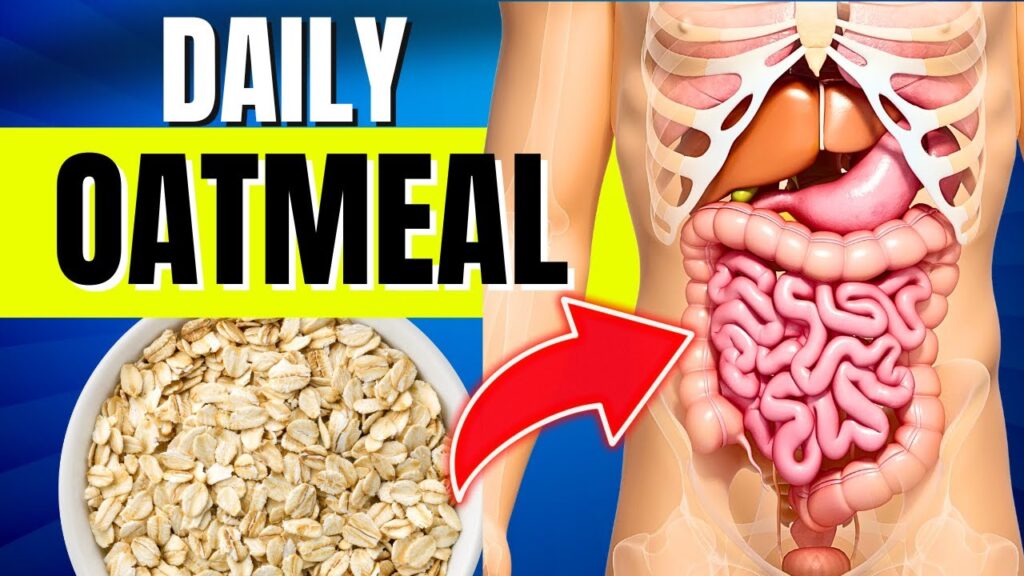Oatmeal is more than just a hearty breakfast option; it’s a nutritional powerhouse that provides numerous benefits for your body when consumed daily. Packed with essential nutrients, fiber, and antioxidants, oatmeal supports overall health and well-being. Here’s a closer look at what happens to your body when you make oatmeal a regular part of your diet.

1. Improved Heart Health
Oatmeal is rich in beta-glucan, a soluble fiber that helps lower LDL (bad) cholesterol levels. Consuming oatmeal daily can reduce the risk of heart disease by preventing cholesterol buildup in your arteries. The antioxidants in oats also contribute to heart health by reducing inflammation and improving blood vessel function.
2. Stabilized Blood Sugar Levels
For individuals managing blood sugar levels, oatmeal is an excellent choice. Its high fiber content slows down the digestion and absorption of carbohydrates, resulting in more stable blood sugar levels. This makes oatmeal particularly beneficial for people with type 2 diabetes or those at risk of developing the condition.
3. Better Digestive Health
The soluble and insoluble fiber in oatmeal promotes healthy digestion. Soluble fiber forms a gel-like substance in the gut, aiding in the smooth passage of food, while insoluble fiber adds bulk to stool, preventing constipation. Regularly eating oatmeal can improve gut health and support a balanced microbiome.
4. Weight Management and Satiety
Oatmeal is low in calories but highly filling, making it a great option for those looking to manage their weight. The beta-glucan in oats increases the feeling of fullness by delaying stomach emptying and releasing appetite-regulating hormones. This helps reduce overall calorie intake and curbs unhealthy snacking.
5. Increased Energy Levels
Oatmeal provides a steady release of energy, making it an ideal breakfast choice. Its complex carbohydrates are digested slowly, offering sustained energy throughout the day. Adding toppings like fruits, nuts, or seeds enhances its energy-boosting properties by providing additional nutrients.
6. Improved Skin Health
Oatmeal contains antioxidants and anti-inflammatory compounds that benefit skin health. It’s often used topically to soothe irritation, but eating oatmeal can also promote healthier skin from the inside out. The vitamins and minerals in oats, such as zinc and manganese, contribute to skin repair and protection.
7. Lowered Risk of Chronic Diseases
The antioxidants in oatmeal, including avenanthramides, have anti-inflammatory and anti-cancer properties. Regular consumption of oatmeal has been associated with a reduced risk of chronic diseases, such as heart disease, type 2 diabetes, and certain cancers.
8. Boosted Immunity
The beta-glucan in oats not only benefits heart health but also enhances immune function. Beta-glucan stimulates the activity of white blood cells, helping your body fight off infections more effectively. Adding oatmeal to your diet can strengthen your immune defenses.
9. Better Bone Health
Oatmeal contains essential minerals like calcium, magnesium, and phosphorus, which are crucial for maintaining strong and healthy bones. While it’s not as calcium-rich as dairy, oatmeal can still contribute to your daily intake of bone-supporting nutrients.
10. Reduced Risk of Hypertension
The soluble fiber and antioxidants in oatmeal help regulate blood pressure by improving blood flow and reducing strain on the cardiovascular system. Eating oatmeal regularly can lower the risk of developing hypertension and its related complications.
How to Make Oatmeal a Daily Staple
- Classic Oatmeal Bowl: Combine rolled oats with water or milk and cook until creamy. Add toppings like fresh fruits, nuts, seeds, or a drizzle of honey for added flavor and nutrients.
- Overnight Oats: Mix oats with milk or yogurt and let them soak overnight. Add your favorite toppings in the morning for a quick, no-cook breakfast.
- Oat Smoothies: Blend oats with milk, fruits, and a scoop of nut butter for a nutrient-packed smoothie.
- Savory Oatmeal: Prepare oats with vegetable broth and top with sautéed vegetables, an egg, or avocado for a savory twist.
Tips for Optimal Benefits
- Choose whole, minimally processed oats like steel-cut or rolled oats for maximum nutritional value.
- Avoid flavored instant oats that often contain added sugars and artificial ingredients.
- Pair oatmeal with protein-rich or healthy-fat toppings to balance your meal and keep you fuller for longer.
Precautions to Keep in Mind
While oatmeal is a healthy choice for most people, individuals with gluten sensitivity or celiac disease should opt for certified gluten-free oats. Additionally, consuming large portions of oatmeal without balancing it with other nutrients may lead to an imbalanced diet.
Conclusion
Eating oatmeal every day offers a range of benefits, from improved heart and digestive health to better skin and stable energy levels. It’s a versatile, affordable, and nutritious food that can support your overall well-being. By incorporating oatmeal into your daily routine, you’re taking a simple but effective step toward a healthier lifestyle. Start enjoying the benefits of oatmeal today and give your body the care it deserves!





